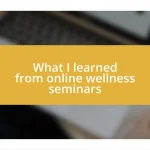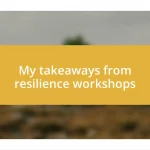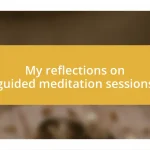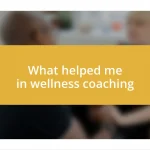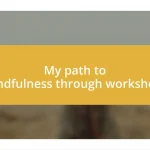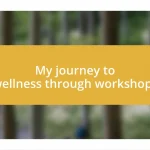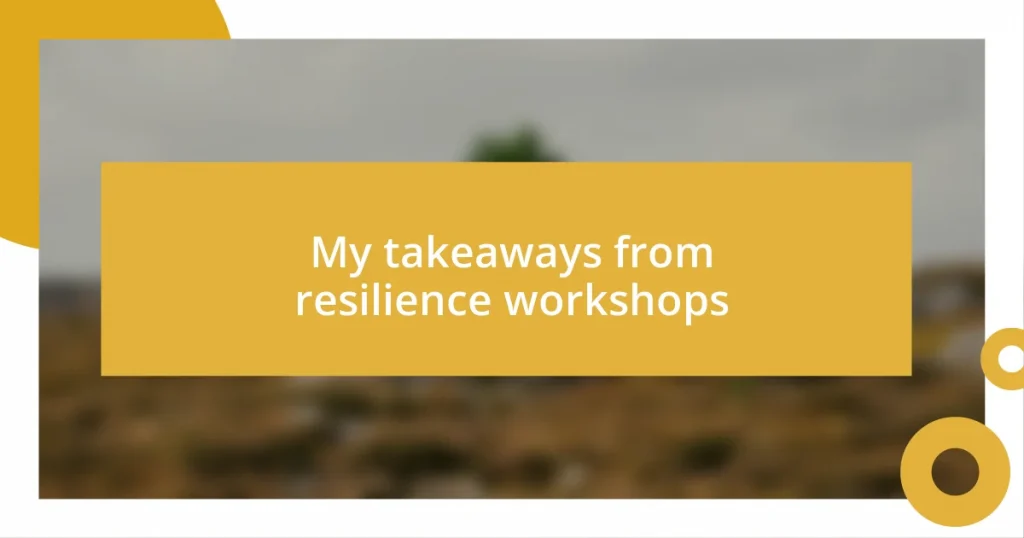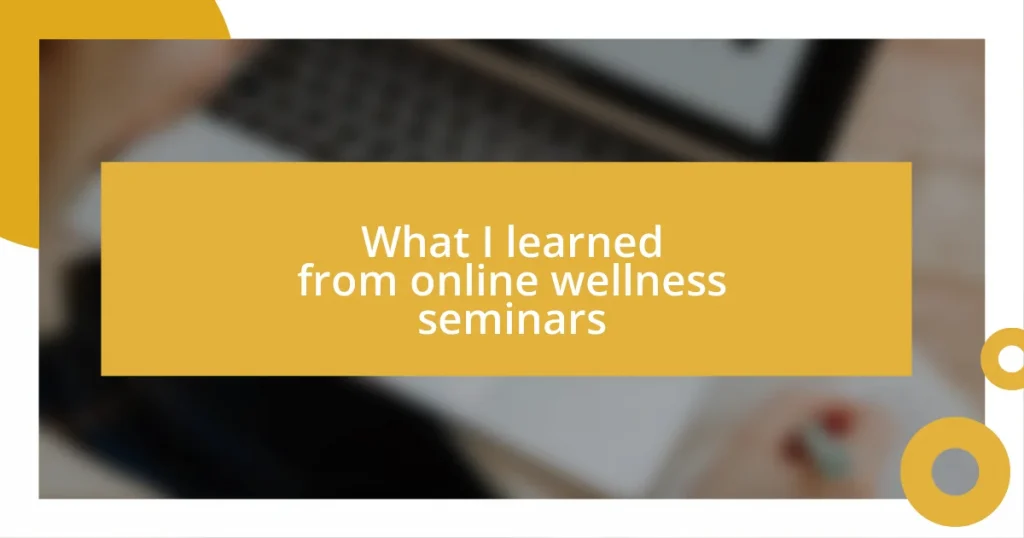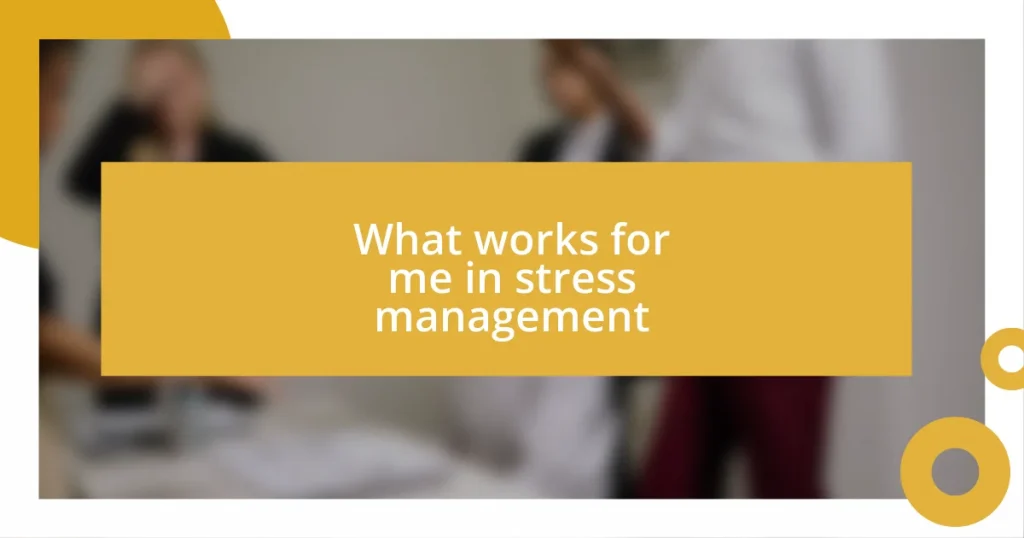Key takeaways:
- Resilience workshops foster personal growth by promoting self-awareness, positive thinking, and adaptive coping strategies, enabling participants to navigate life’s challenges with confidence.
- Building a supportive community through shared experiences in workshops creates strong connections, enhancing empathy and providing motivation to overcome personal struggles.
- Long-term resilience leads to improved well-being, shifts in mindset towards viewing challenges as growth opportunities, and fosters deeper connections in relationships through vulnerability.
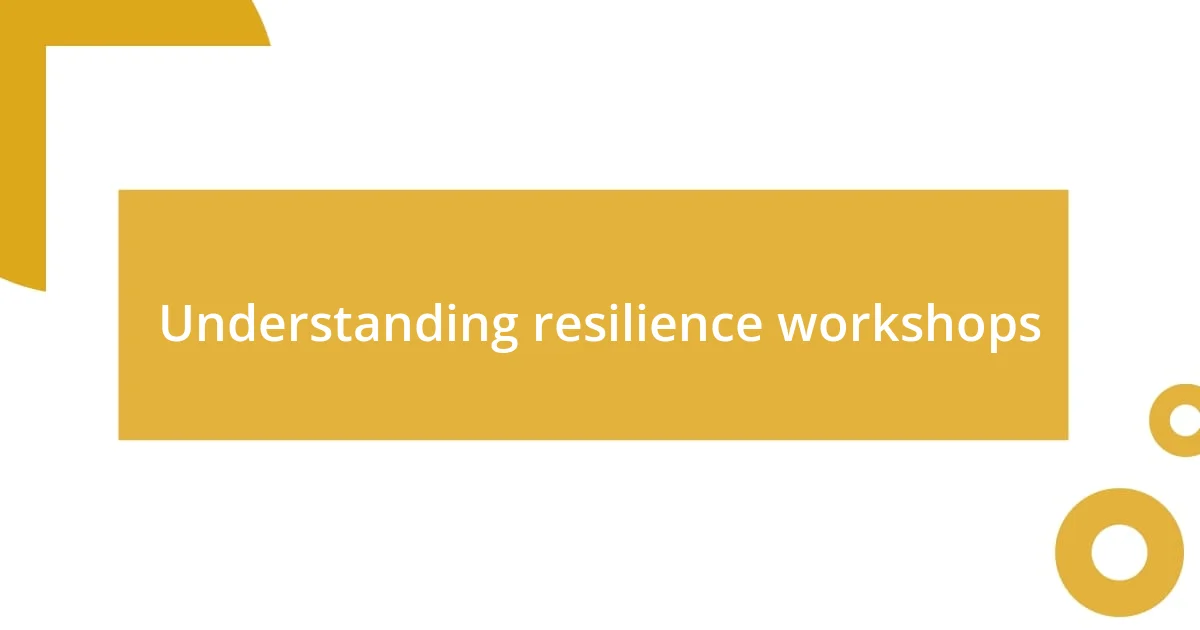
Understanding resilience workshops
Resilience workshops are designed to help individuals develop the mental strength needed to navigate life’s challenges. I remember attending my first resilience workshop and thinking, “Can I really change my mindset this much?” It felt a bit daunting at first, but as the sessions progressed, I realized that these workshops provide practical strategies and tools that anyone can adopt, no matter their starting point.
During my experience, I learned that resilience isn’t just about bouncing back; it’s about bouncing forward. One particular exercise that stood out involved sharing our personal challenges in small groups. The vulnerability in that room was palpable. From hearing others’ stories, I found a sense of connection and understanding that often felt missing in everyday life. Have you ever felt isolated in your struggles? These workshops create a space where such feelings can dissipate.
I also discovered that the concept of resilience encompasses various skills, such as emotional regulation and problem-solving. In one session, we practiced mindfulness techniques that helped ground us when situations felt overwhelming. I still use those techniques today; they’ve become a lifeline in stressful moments. This process made me appreciate how resilience can be cultivated through practice and awareness, allowing us to face adversity with more confidence and clarity.
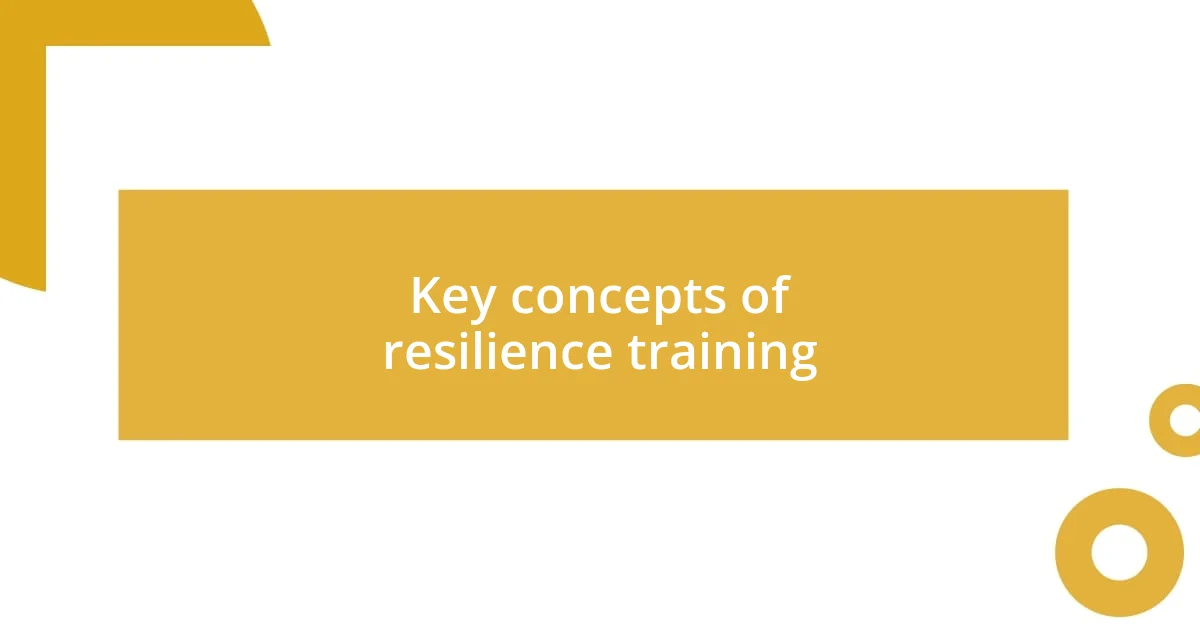
Key concepts of resilience training
The essence of resilience training revolves around personal growth and mindset transformation. I recall a particularly illuminating moment during one workshop where we were asked to identify our core values. This exercise shifted my perspective dramatically. I realized that aligning my actions with my values not only fortified my resilience but also gave me a clearer sense of purpose during turbulent times. Understanding what motivates and drives us is fundamental in nurturing our ability to bounce back.
Here are some key concepts commonly covered in resilience training:
- Self-awareness: Recognizing our thoughts and emotions helps us respond rather than react in challenging situations.
- Positive thinking: Cultivating an optimistic outlook can influence our ability to navigate stress effectively.
- Adaptive coping strategies: Learning to replace negative coping methods with constructive ones makes a significant difference in resilience.
- Support systems: Building strong, positive relationships provides a foundation that fosters resilience in times of need.
- Growth mindset: Embracing challenges as opportunities for growth enhances our ability to overcome obstacles.
Reflecting on these concepts helped me understand that resilience is a skill we can learn and strengthen, not an inherent trait we either have or don’t have.
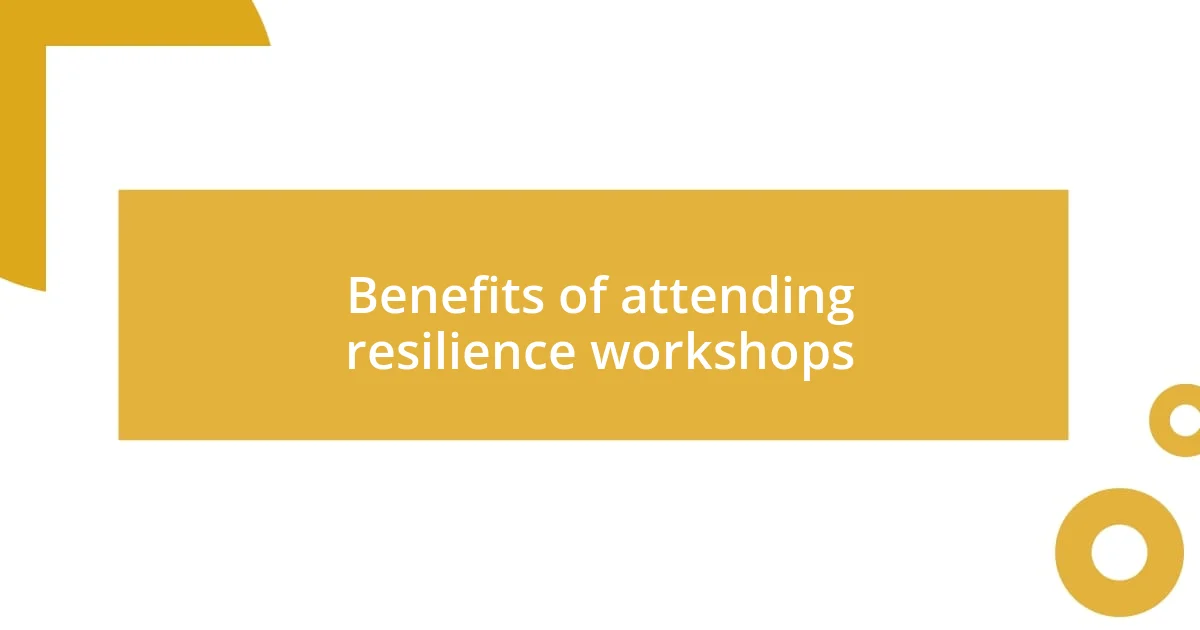
Benefits of attending resilience workshops
Attending resilience workshops has been a transformative journey for me. One standout benefit I discovered was the development of a supportive community. Sharing and hearing personal stories created strong bonds among participants. I remember one instance where a fellow attendee’s experience mirrored my own. That connection not only bolstered my sense of belonging but also encouraged me to push through my challenges. Isn’t it amazing how shared experiences can uplift and motivate us to grow?
Another key benefit was the practical toolkit these workshops provided. I was introduced to techniques like cognitive reframing, which involves changing the way we perceive challenges. We worked on scenarios that felt insurmountable and learned to approach them from different angles. After the training, I applied this in my daily life, especially during stressful work periods. By shifting my perspective, I was able to handle pressure with much more composure. Have you ever tried taking a step back and looking at a problem in a new light?
Lastly, the workshops emphasized self-care as an integral component of resilience. I found out that prioritizing my mental and emotional health made a substantial difference in my ability to cope. For instance, after learning about the importance of regular breaks and mindfulness, I started to incorporate short meditation sessions into my routine. This small adjustment helped me reclaim focus and energy, significantly enhancing my resilience in everyday situations.
| Benefit | Description |
|---|---|
| Community Support | Building connections with others facing similar challenges fosters empathy and understanding. |
| Practical Tools | Workshops provide techniques like cognitive reframing to help participants approach challenges differently. |
| Self-Care Emphasis | Learning the importance of self-care helps individuals prioritize their mental health, aiding resilience. |
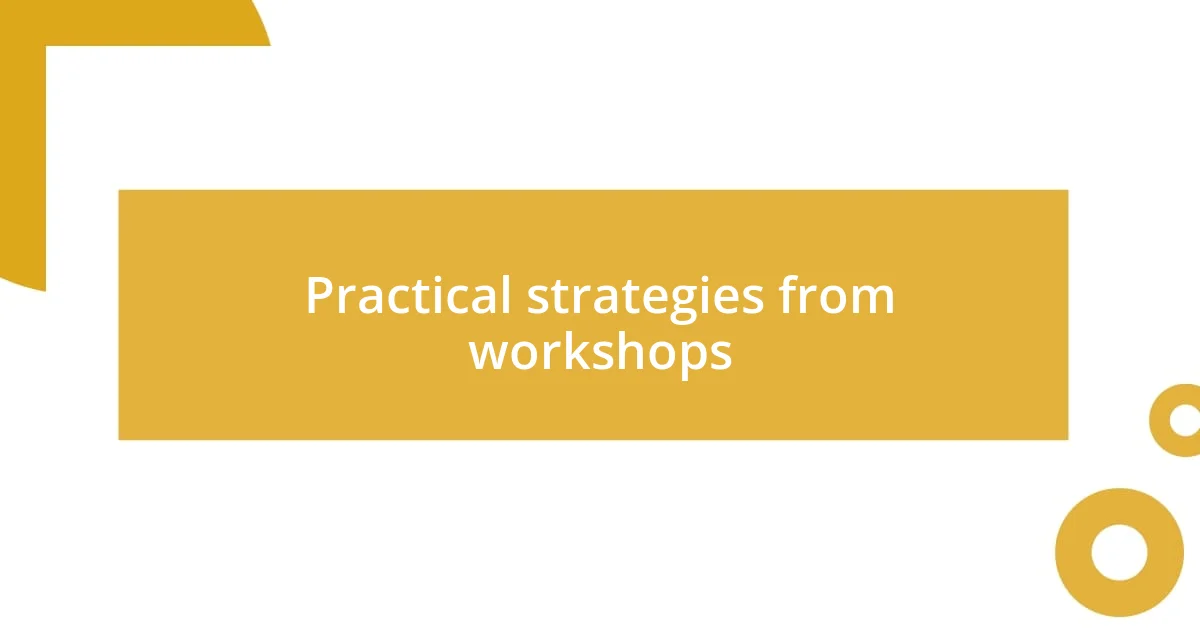
Practical strategies from workshops
One practical strategy that stood out to me was the use of journaling for self-reflection. During one workshop, the facilitator encouraged us to spend a few minutes each day writing down our thoughts and feelings. I found this simple practice incredibly powerful—it not only helped me process my emotions but also allowed me to spot patterns in my thinking. Have you ever noticed how putting pen to paper can clarify your mind? It becomes easier to understand what truly matters to you.
Another effective approach we learned was the importance of setting realistic goals. I vividly remember breaking down a huge project into smaller, manageable tasks during a group activity. This helped me feel less overwhelmed and more in control. Instead of being paralyzed by the enormity of the task, I was able to celebrate small victories along the way. It’s like running a marathon; focusing on one mile at a time makes the finish line feel achievable rather than daunting.
Additionally, we delved into stress management techniques that I now incorporate into my daily routine. Breathing exercises became my go-to tool for making stressful moments more bearable. I still recall a workshop exercise where we practiced deep breathing combined with visualization. Imagining a peaceful scene while breathing deeply truly transformed my stress levels. Have you tried using simple breaths to anchor yourself during chaotic times? It’s fascinating how a few moments of mindful breathing can ground me, allowing me to tackle whatever comes next with renewed energy.
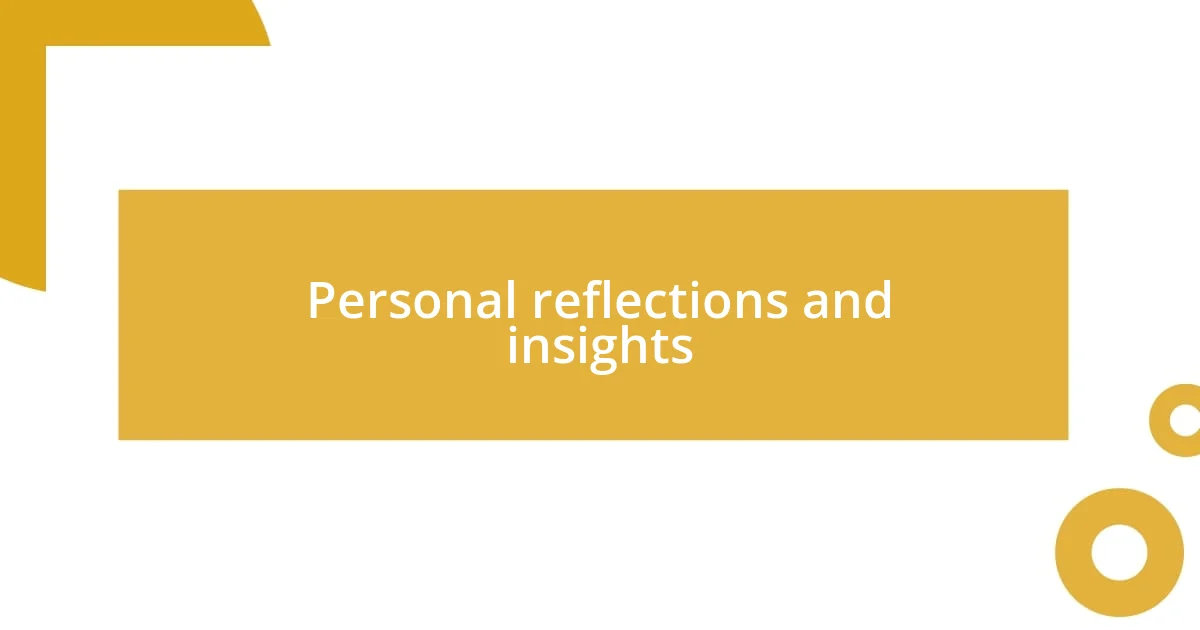
Personal reflections and insights
During the resilience workshops, I often found myself reflecting on how our interpretations of adversity shape our experiences. I remember a moment when a facilitator asked us to share a recent challenge and how we viewed it. Hearing others talk about their struggles struck a chord with me. I realized it’s not just about the challenge itself but our perception that defines our resilience. Have you ever considered how your mindset influences your ability to overcome obstacles? I’ve started to notice this in my own life, especially when facing uncertainty.
Another striking insight was the power of vulnerability. Initially, I felt hesitant to share my own story, worried about how others would react. But as I listened to others open up about their journeys, I felt an overwhelming sense of connection and safety. This taught me that true strength often lies in our willingness to be vulnerable. It made me wonder: why do we fear sharing our struggles when they can forge deeper connections? Embracing vulnerability has become a game changer for me, both in relationships and within myself.
One of the most impactful lessons I absorbed was the importance of mindset shifts during difficult times. I recall a workshop exercise where we challenged our negative beliefs. At first, I was skeptical, questioning if such changes were even possible. But, as I worked through the prompts, I felt a weight lift off my shoulders. It dawned on me that reframing my thoughts could drastically alter my feelings and responses. Have you experienced the freedom that comes from transforming a negative thought into a constructive one? For me, this insight has made resilience feel not just achievable but empowering.
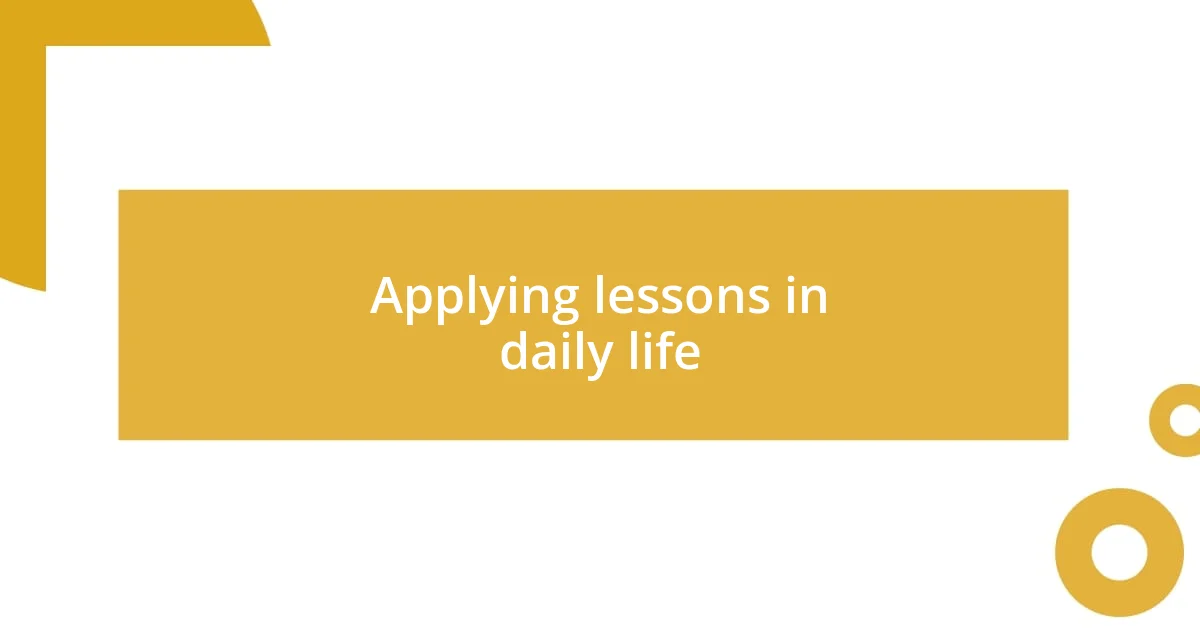
Applying lessons in daily life
One lesson I’ve actively integrated into my daily life is the practice of gratitude. After one workshop, I started maintaining a gratitude jar—every night, I jot down something I’m thankful for and place it inside. This small ritual has profoundly shifted my perspective, reminding me to recognize the positive amidst life’s chaos. Have you ever taken a moment to appreciate the little things? It really does create a ripple effect of positivity throughout the day.
I’ve also begun viewing challenges as opportunities for growth. This shift in mindset crystallized during an intense discussion in one workshop about failure. I still remember how a fellow participant shared their experience of learning from a business setback. It hit home for me; I realized that every stumble can teach us something valuable. Are you sometimes hesitant to step out of your comfort zone? Embracing this belief has encouraged me to tackle new endeavors without the paralyzing fear of making mistakes.
Lastly, I now consciously prioritize mindfulness throughout my day. This was inspired by a guided meditation session we had in a workshop. Initially skeptical, I thought it wouldn’t make a difference. But as I started to incorporate short moments of mindfulness—whether it’s while sipping my morning coffee or walking in nature—I found that my days felt less chaotic and more centered. Have you explored the power of being present? It’s fascinating how a few minutes of focus can transform stress into clarity.
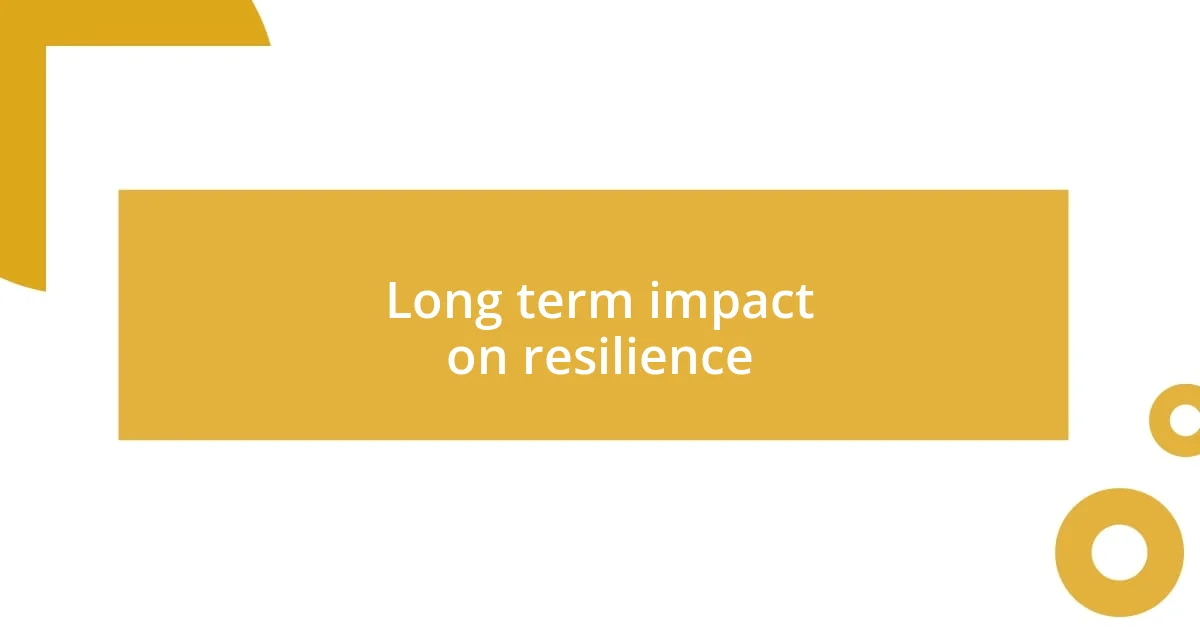
Long term impact on resilience
I’ve come to realize that the long-term impact of resilience goes far beyond immediate reactions to adversity. Reflecting on my journey after the workshops, I noticed how my ability to bounce back has intertwined with my overall sense of well-being. For instance, there were times when I felt overwhelmed, but by consistently applying the techniques I learned, I now approach challenges with a different mindset. Isn’t it empowering to think that our resilience can enhance our life satisfaction over time?
One unexpected personal revelation struck me; building resilience has transformed not just how I handle difficulties, but also how I interact with others. I recall a conversation with a friend who was struggling, and instead of offering my usual advice, I shared my own vulnerabilities and the lessons I’ve learned. It deepened our bond and shifted our discussion into a supportive space. Have you experienced that kind of connection when you open up? It’s profound how resilience fosters empathy and connection in our relationships.
Additionally, the ongoing practice of resilience cultivates a sense of purpose that I hadn’t fully appreciated before. I often find myself reflecting on the goals I’ve set in my life and how my experiences shape them. This perspective allows me to see the bigger picture in the face of adversity. As I navigate challenges now, I ask myself: how can this experience contribute to my growth and ambitions? It’s invigorating to think that resilience isn’t just about surviving; it’s about thriving in the long run.
